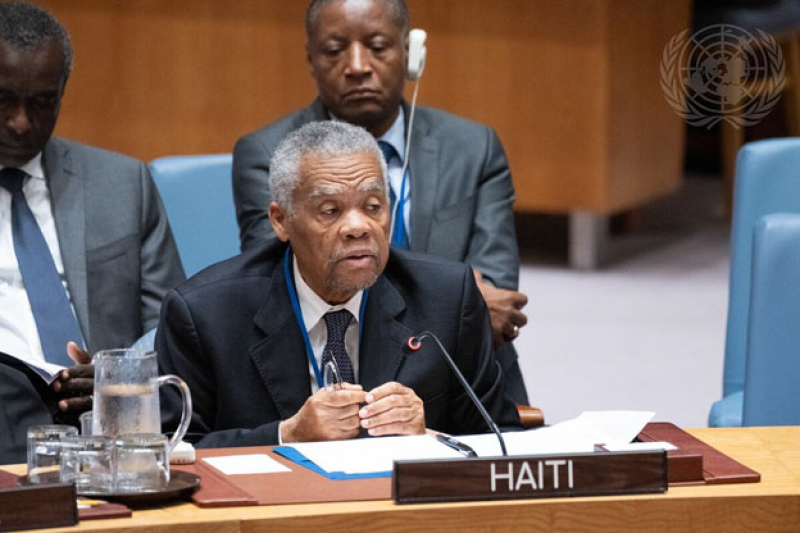- India Sees 9% Drop in Foreign Tourists as Bangladesh Visits Plunge |
- Dhaka Urges Restraint in Pakistan-Afghan War |
- Guterres Urges Action on Safe Migration Pact |
- OpenAI Raises $110B in Amazon-Led Funding |
- Puppet show enchants Children as Boi Mela comes alive on day 2 |
Escalating Gang Violence in Haiti Threatens to Override State Control

Pierre Ericq Pierre, Permanent Representative of Haiti to the United Nations, addresses the Security Council meeting on the question concerning Haiti.
Over the month of June, the security situation in Haiti has taken a considerable turn for the worse, with armed gangs continuing to coordinate brutal attacks, seize more territory, and obstruct critical humanitarian aid deliveries. In the past week, new waves of hostilities were reported in the nation’s Centre Department, raising concern among humanitarian organizations that gang influence could soon completely overpower state control.
“As gang control expands, the state’s capacity to govern is rapidly shrinking, with social, economic, and security implications,” said Ghada Fathi Waly, Executive Director of the United Nations Office on Drugs and Crime (UNODC). “This erosion of state legitimacy has cascading effects,” such as the suspension of legal commerce along critical trade routes and worsening food insecurity.
Approximately 90 percent of the nation’s capital, Port-au-Prince, is estimated to be under gang control, with widespread cases of abuse and impunity documented. On July 2, Miroslav Jenča, Assistant Secretary-General for the Americas at the Department of Political Affairs (DPPA), informed reporters that international commercial flights have been suspended, effectively leaving the capital “paralyzed” and “isolated.”
“Since January, gangs have only strengthened their foothold, now affecting all communes of the Port-au-Prince metropolitan area and beyond, pushing the situation closer to the brink,” said Jenča. “Without increased action by the international community, the total collapse of state presence in the capital could become a very real scenario.”
On July 7, the Office for the Coordination of Humanitarian Affairs (OCHA) released its latest situation report detailing escalating insecurity across several communes in the Centre Department. According to the report, the security situation in the Lower Plateau was destabilized following an attack on the Lascahobas commune on July 3, which triggered mass displacement to surrounding areas where resources were already stretched.
Before these attacks, Belladere and Hinche housed approximately 27,000 and 10,000 displaced individuals, respectively. The International Organization for Migration (IOM) reports that following the attacks, roughly 16,250 Haitians (or 4,003 households) were forced to flee from Lascahobas, with 57 percent displaced to Belladere, 14 percent to Hinche, 8 percent to Savanette, and 18 percent to a neighboring municipality in the West Department.
This attack underscores the drastic escalation of hostilities in previously calm areas. Prior to the attacks on Mirebalais and Sauts-d’Eau in March, the Centre Department had largely been isolated from gang-related violence. This is also true for the southern and eastern regions of Haiti, with the latter reporting numerous cases of gangs exploiting critical crossings used for the movement of goods.
In addition to combating gang activity, the Haitian National Police (HNP) have struggled to control the emergence of self-defense groups. “While some are motivated by the urgent need to protect their communities, many operate outside existing legal frameworks, in some cases engaging in extrajudicial actions and colluding with gangs,” said Waly.
Despite some of these groups serving as critical lines of defense in numerous regions, many participate in extrajudicial actions that violate international humanitarian law and exacerbate regional insecurity.
“Although these groups often serve as the last remaining security mechanisms in many areas, they violate fundamental human rights, including the right to life and the right to a fair trial, and simultaneously fuel further violence in the form of retaliatory attacks by gangs,” said Jenča. Over the last three months, these groups reportedly killed at least 100 men and one woman suspected of gang association or collaboration. Waly adds that these actions increase national demand for guns, military weapons, and ammunition, fueling illicit arms markets and violent crimes.
Additionally, humanitarian organizations have expressed concern over the recent use of drone technology by armed groups to conduct surveillance on their territories and track HNP movements. These tactics were first observed during the March 2024 attacks on two of Haiti’s largest prisons in Port-au-Prince and Croix des Bouquets. The use of drones in densely populated civilian areas raises concerns about a lack of regulations and operational frameworks.
Furthermore, the UN has underscored persistent human rights violations, particularly human trafficking. Over the past three months, the United Nations Integrated Office in Haiti (BINUH) recorded a significant increase in sexual violence, which has been worsened by underreporting, social stigma, and fear of reprisals. BINUH has also reported cases of illegal organ removal.
According to a UN spokesperson, the current humanitarian situation in Haiti is especially alarming due to the Haitian government’s lack of action in addressing the structural gaps that have allowed gang violence to prosper.
“While the expansion of territorial control brings gangs additional sources of revenue and bargaining power, these attacks are also backed by individuals trying to destabilize the political transition for their own political goals,” UN experts said, highlighting how gangs have exploited the disorganized response to the security crisis.
To bring lasting change to Haiti, it is imperative for the international community to scale up responses, particularly to assist the relatively weak national police and the multinational force. Furthermore, Haiti must establish stricter regulations on the importation of weapons.

